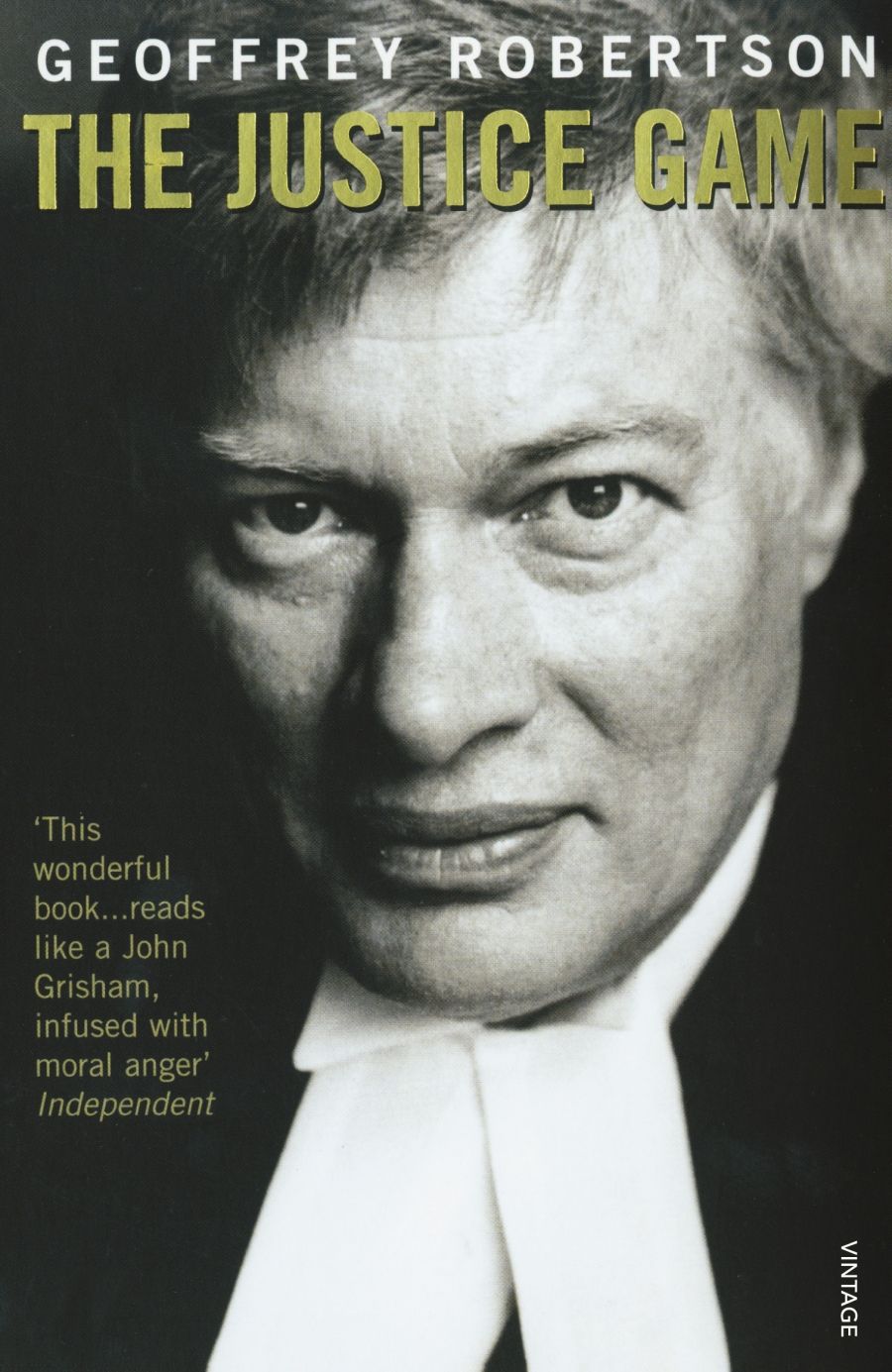
- Free Article: No
- Contents Category: Law
- Review Article: Yes
- Online Only: No
- Custom Highlight Text:
The memoirs of any barrister still in harness are, by definition, advertising. The mystery of The Justice Game is what on earth Geoffrey Robertson needs to sell. He is much too busy already. A queue of life’s victims wanting his help in court would stretch twice round the Temple. But drumming up business is not what the book is about. Its real purpose, I suspect, is to show that, despite a certain radical reputation, Robertson is a sound man.
- Book 1 Title: The Justice Game
- Book 1 Biblio: Chatto & Windus, $35 hb, 415 pp
- Book 1 Readings Link: https://www.booktopia.com.au/the-justice-game-geoffrey-robertson/book/9780099581918.html
Robertson took those calls, fought some famous cases very well, prospered hugely, and after thirty years has reached that legal plateau where only the mountain range of the high judiciary is left for him to conquer. Now he is written The Justice Game, which lays out a version of his career: from Abbie Hoffman saved at Heathrow in 1971, to the Tory sleaze Neil Hamilton destroyed in 1996. He has caused havoc to the Establishment, yet argues on his own behalf that he is a cap to be trusted.
Robertson has holidayed in Tuscany with Tony Blair, could have a peerage if he wanted one, puts a lot of daylight between himself and ‘the Left’, deplores people making jokes in Who’s Who, has attended at least one Anglican harvest festival, trowels on the flattery of judges and QCs, can ask £30,000 to take a case, is silent on changing the ‘pantomime’ of Bar rituals, believes in trials and not truth commissions, can see the ‘poetic justice’ of summary execution, takes tea with the morals campaigner Mary Whitehouse, and sits from time to time as a judge of the Knightsbridge Crown Court.
Sounder still is the pervading optimism of The Justice Game. He admits the Establishment is as mired as ever by selfregard. He is good on what he calls ‘the canker of cover up’. The argument he makes for a bill of rights is as persuasive for Australia as it is for Britain. He acknowledges how terrible the libel laws are (‘pay attention again, Australia’) and has a shrewd outsider’s eye for the way class infects the operation of British justice.
Despite all his years in London, he has not lost faith in the high romance of the Bar. He reckons advocates are better these days, juries more merciful, and judges are being appointed with ‘a more acceptable social, sexual and racial mix.’ (Note: nothing about a more acceptable political mix.) He claims the Law, as portrayed by writers and dramatists, is caught in a time warp. Horace Rumpole, Robertson says, would be bankrupted these days by costs awarded against him for wasting everyone’s time.
Sound chap. But that this is the memoir of a man eligible for high office in Britain is the least reason for recommending it to Australian readers. Writers forget that lawyers, too, are storytellers to the tribe and Robertson tells the tales of his great cases with passion and clarity. These are stories of gun running, government deceit, negligence in war and cruelty in peace, the thuggery of dictators ‘Malawi, Singapore, old South Africa’, the inexhaustible madness of morals campaigners and the pretentions of the very, very rich. This is life beating fiction at its own game, complex tales told with a sure instinct for detail against a background of high political drama.
How strange it is to see how a little public spotlight has followed Geoff Robertson ever since his Sydney University days. This is no accident. He understands the uses of publicity ‘for himself and his clients’ and is not one of those hypocrite QCs who belittle journalists while courting their attention. He acknowledges ‘at least by implication’ what most lawyers are shy to admit: that at times all a client can hope for is public attention. Amnesty International sends him to apartheid’s Homelands so we pay more notice to outrages there. He isn’t modest about this. These tactics, he writes, ‘served the cause of human rights rather more effectively than all the posturing of Western diplomats and politicians.’
The publicity Robertson affords himself in The Justice Game is carefully crafted and sometimes a little embarrassing. His argument for the even-handed virtues of the Bar ‘that barristers are taxi cabs for anyone to hail’ might be more convincing if we saw him working for an outright baddie before page 380. It is goodies all the way until that IRA bomb-maker Dessie Ellis appears in the Afterword and Robertson gets him off on a jurisdictional technicality. The QC can still sleep at night, he explains, ‘Because it proved that the British State was fair enough to allow itself to be beaten at its own game.’
The underlying purpose of the book Robertson says is to show ‘how the law may humble the most powerful’. In the course of The Justice Game, he credits himself with helping put the written word ‘beyond the long arm’ of obscenity laws, with embedding more firmly in criminal law its ‘most significant feature’ (the jury’s right to acquit), with helping homosexual books and magazines become ‘commonplace’ in Britain and with having a key early role in both Tony Blair’s landslide win in 1997 and the new British government’s emphasis on human rights in foreign policy.
All this and he is only fifty-one. Phew!
While we wait to see what destiny in the person of new Labour holds in store for Geoffrey Robertson, we have this first volume of memoirs, The Justice Game, to entertain us. He is good company, a fine advocate – not least on his own behalf – and has great stories to tell about that endlessly interesting world of utter bastardry, high principle, and funk that we and the British call the Law.


Comments powered by CComment